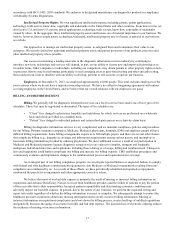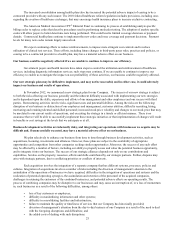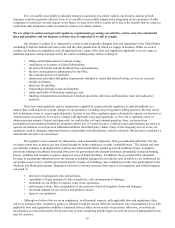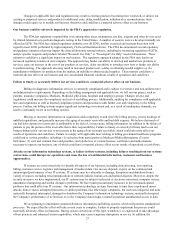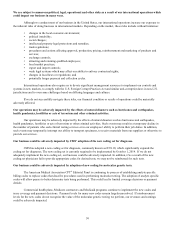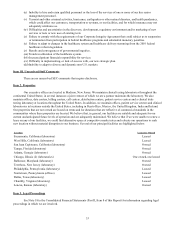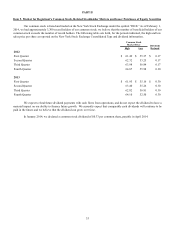Quest Diagnostics 2013 Annual Report Download - page 31
Download and view the complete annual report
Please find page 31 of the 2013 Quest Diagnostics annual report below. You can navigate through the pages in the report by either clicking on the pages listed below, or by using the keyword search tool below to find specific information within the annual report.27
Changes in applicable laws and regulations may result in existing practices becoming more restricted, or subject our
existing or proposed services and products to additional costs, delay, modification, withdrawal or reconsideration. Such
changes could require us to modify our business objectives and could have a material adverse effect on our business.
Our business could be adversely impacted by the FDA's approach to regulation.
The FDA has regulatory responsibility over, among other areas, instruments, test kits, reagents and other devices used
by clinical laboratories to perform diagnostic testing in the United States. A number of esoteric tests we develop internally are
offered as LDTs. The FDA has claimed regulatory authority over all LDTs, but has exercised enforcement discretion with
regard to most LDTs performed by high complexity CLIA-certified laboratories. The FDA has announced several regulatory
and guidance initiatives that may impact the clinical laboratory testing business, including by increasing regulation of LDTs,
analyte specific reagents and products labeled "Research Use Only" or "Investigate Use Only" used in laboratories. These
initiatives could have a significant impact on our business. The regulatory approach adopted by the FDA may lead to an
increased regulatory burden on our Company. The approach may hinder our ability to develop and market new products or
services, cause an increase in the cost of our products or services, delay our ability to introduce new tests or hinder our ability
to perform testing. The approach also may result in increased product cost, a delay in obtaining needed supplies or, if a
manufacturer withdraws its products from the market, an inability to obtain needed supplies. These matters could have a
material adverse effect on our business and our consolidated financial condition, results of operations and cash flows.
Failure to timely or accurately bill for our services could have a material adverse effect on our business.
Billing for diagnostic information services is extremely complicated and is subject to extensive and non-uniform rules
and administrative requirements. Depending on the billing arrangement and applicable law, we bill various payers, such as
patients, insurance companies, Medicare, Medicaid, physicians, hospitals and employer groups. Changes in laws and
regulations could increase the complexity and cost of our billing process. Additionally, auditing for compliance with applicable
laws and regulations as well as internal compliance policies and procedures adds further cost and complexity to the billing
process. Further, our billing systems require significant technology investment and, as a result of marketplace demands, we
need to continually invest in our billing systems.
Missing or incorrect information on requisitions adds complexity to and slows the billing process, creates backlogs of
unbilled requisitions, and generally increases the aging of accounts receivable and bad debt expense. We believe that much of
our bad debt expense in recent years is attributable to the lack of, or inaccurate, billing information (in addition to the failure of
patients to pay the portion of the receivable that is their responsibility). Failure to timely or correctly bill may lead to our not
being reimbursed for our services or an increase in the aging of our accounts receivable, which could adversely affect our
results of operations and cash flows. Failure to comply with applicable laws relating to billing government healthcare programs
could lead to various penalties, including: (1) exclusion from participation in Medicare/Medicaid programs; (2) asset
forfeitures; (3) civil and criminal fines and penalties; and (4) the loss of various licenses, certificates and authorizations
necessary to operate our business, any of which could have a material adverse effect on our results of operations or cash flows.
Attacks on our information technology systems, or failure in these systems, including failures resulting from our systems
conversions, could disrupt our operations and cause the loss of confidential information, customers and business
opportunities.
IT systems are used extensively in virtually all aspects of our business, including clinical testing, test reporting,
billing, customer service, logistics and management of medical data. Our success depends, in part, on the continued and
uninterrupted performance of our IT systems. IT systems may be vulnerable to damage, disruptions and shutdown from a
variety of sources, including telecommunications or network failures, human acts and natural disasters. Moreover, despite the
security measures we have implemented, our IT systems may be subject to physical or electronic intrusions, computer viruses,
unauthorized tampering and similar disruptive problems. We have taken precautionary measures to prevent unanticipated
problems that could affect our IT systems. Our information technology systems from time to time have experienced minor
attacks, minor viruses, attempted intrusions or similar problems, like other major companies, but each was mitigated, and none
materially disrupted, interrupted, damaged or shutdown the Company's information technology systems, materially disrupted
the Company's performance of its business or, to the Company's knowledge, resulted in material unauthorized access to data.
We are planning to implement common laboratory information and billing systems, which will promote standardized
processes. We expect that this effort will take several years to complete. Failure to properly implement this process could
materially adversely affect our business. During system conversions of this type, workflow is re-engineered to take advantage
of best practices and enhanced system capabilities, which may cause temporary disruptions in service. In addition, the


